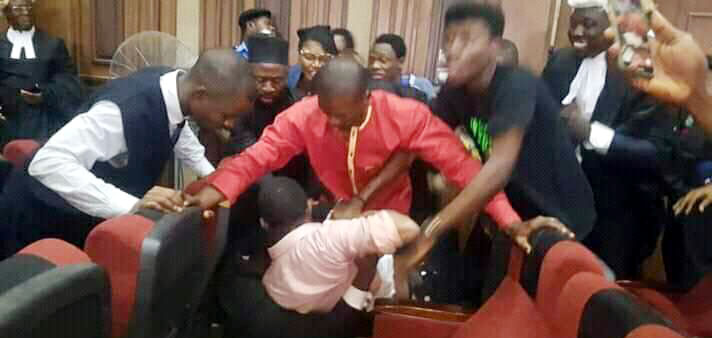The Nigerian federal government on Tuesday (24 December) ordered the release of the convener of #RevolutionNow protests, Omoyele Sowore, who has been in detention since August.
The Minister of Justice and Attorney General of the Federation (AGF), Abubakar Malami, announced the decision in a statement.
The move followed mounting local and international pressure on the administration of President Muhammadu Buhari to obey court rulings freeing Sowore, who is also the publisher of the online news site Sahara Reporters.
The government also freed former National Security Adviser, Colonel Sambo Dasuki (rtd), who has been in detention for more than 4 years for issues related to the management of campaign funds for the former ruling People’s Democratic Party.
Nigeria’s secret service, the Department of State Services (DSS), arrested Sowore on 3 August before the commencement of a nationwide protest, tagged #RevolutionNow, he had called for. The planned action was to protest against the reigning insecurity, economic despondency and mass unemployment in the country.

Sowore was arraigned alongside co-activist Olawale Bakare on counts bordering on treasonable felony and money laundering, among others, but which they both denied.
Both men continued to be held by the security agency despite an order of the court granting them bail.
Following a second court order, Sowore and Bakare were released on 5 December, but the Sahara Reporters publisher , who was a candidate at Nigeria’s last presidential election, was rearrested barely 24 hours later by the DSS in a court room in session. The US State Department in reaction to the re-arrest of Sowore reminded the Nigerian government that, “Respect for the rule of law, judicial independence, political and media freedom, and due process are key tenets of democracy”.
American politicians and other international personalities and organisations criticised the Nigerian government over its behaviour in the Sowore case, with Amnesty International declaring Sowore and Bakare and another journalist Agba Jalingo, detained over treason charges as well, as prisoners of conscience.

On the other hand, Dasuki was arrested on 29 December 2015 over an allegation of diverting $2.1 billion arms funds while serving as the National Security Adviser during the administration of former President Goodluck Jonathan. He was accused of awarding phantom contracts to buy 12 helicopters, four jets and ammunition for the war against Boko Haram insurgents while the money was diverted to fund Jonathan’s reelection campaign in 2015.
Dansuki was arraigned in court and granted bail with certain conditions, but the federal government refused to release him in disobedience to the court order.
In July 2019, the Court of Appeal in Abuja declared the continued detention of Dasuki by the DSS as illegal, unlawful and unconstitutional.
In the Tuesday statement released by the federal government, Justice Minister Malami said the decision to release Sowore and Dansuki was in compliance with the bail granted the two men by the court.
Analysts are questioning why the government had earlier refused to obey the court decisions in the two cases and several others, accusing the Buhari administration of eroding confidence in the country’s judiciary.
Nigeria has lately been criticised for not upholding the principles of rule of law in the way it has been handling political opposition, betraying the hopes of Nigerians that democracy would be deepened by Buhari’s victory at the 2015 general election, the first time that presidential power would change hands peacefully from one party to another in the country’s history.
Elections conducted since 2015, including the 2019 general polls at which Buhari was reelected, have been marred by irregularities with opposition party alleging massive rigging in favour of Buhari’s ruling All Progressive Party.
Many critics have also openly accused the government of taking Nigeria back to the unsavoury past of dictatorship due to its flagrant disrespect for court judgments and the stifling of the political space. The question yet to be answered by the government is, if it’s fundamentally committed to the principles of rule of law and electoral justice without which Nigeria’s democracy is headed for disaster.
Kola Tella
 THE AFRICAN COURIER. Reporting Africa and its Diaspora! The African Courier is an international magazine published in Germany to report on Africa and the Diaspora African experience. The first issue of the bimonthly magazine appeared on the newsstands on 15 February 1998. The African Courier is a communication forum for European-African political, economic and cultural exchanges, and a voice for Africa in Europe.
THE AFRICAN COURIER. Reporting Africa and its Diaspora! The African Courier is an international magazine published in Germany to report on Africa and the Diaspora African experience. The first issue of the bimonthly magazine appeared on the newsstands on 15 February 1998. The African Courier is a communication forum for European-African political, economic and cultural exchanges, and a voice for Africa in Europe.





























